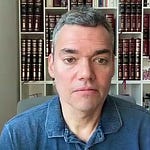For the foreseeable future, our Zoom calls will be held at a new time: Friday at 11 AM Eastern.
Our guest this week will be Lily Greenberg Call, former Special Assistant to the Chief of Staff at the Department of Interior, who last week resigned to protest US policy in Gaza. She is the first Jewish Biden administration staffer to resign over the war. For ten years, until 2022, she was a youth activist for AIPAC. Her resignation constitutes perhaps the most remarkable illustration yet of the speed with which many young American Jews are abandoning previously held views about Israel and joining the struggle for Palestinian freedom.
Paid subscribers will get the link this Tuesday and the video the following week. They’ll also gain access to our library of past Zoom interviews with guests like Rashid Khalidi, Thomas Friedman, Ilhan Omar, Benny Morris, Noam Chomsky, and Bret Stephens.
Sources Cited in this Video
The Student Non-Violent Coordinating Committee’s (SNCC) impact on Students for a Democratic Society (SDS).
Senator J.D. Vance proposes Viktor Orban’s takeover of Hungary’s universities as a model for the US.
Things to Read
(Maybe this should be obvious, but I link to articles and videos I find provocative and significant, not necessarily ones I entirely agree with.)
On the Jewish Currents (subscribe!) podcast, I talked with Arielle Angel, Mari Cohen, and Daniel May about Zionism and anti-Zionism.
Like so many people with family in Gaza, the political analyst Khalil Sayegh has endured unthinkable agony since this war began. He’s seen his father and sister killed. He’s trying to bring his remaining family members to safety. If you can help, please do. Please also consider helping the Alshawa family, which is sheltering in central Gaza and hoping to evacuate to safety.
What Israeli leaders mean when they talk about Gaza’s future.
How American universities are purging pro-Palestinian faculty.
A child of Holocaust survivors speaks about why he’s protesting the war.
An Israeli risks her life to try to stop Israelis from preventing aid from entering Gaza.
Rick Perlstein on why the current crackdown on campus protest is worse than the 1960s.
See you on Friday at 11 AM,
Peter
VIDEO TRANSCRIPT:
I want to say a couple more things about the campus protests that have really roiled universities this spring. There’s always the danger, of course, that attention to this distracts us from what’s happening in Gaza, which is much, much more significant. But this is really, I think, a movement whose impact will kind of resound in terms of American politics and American life for a long time to come. And so, I think that thinking about a couple of more of its dynamics might be useful. And I want to make three points based on some other campuses that I visited since a video I did a couple weeks ago.
The first is, I think, one of the things the media has not sufficiently emphasized is the impact of the Black Lives Matter movement on this movement. That it is not a coincidence that we had this huge upswell in protesting around the George Floyd incident several years ago. Now we have this. I was at Whitman College in Washington and talked to a number of students who were involved in the encampment there. This is, you know, a fairly small college. And what struck me again and again was how many of them had been introduced to protest by the George Floyd moment back when they were still in high school, and that often around the edges of that movement was when they got connected to issues about Palestinian organizing, that someone handed them a pamphlet or there was someone who was Palestinian in that movement or someone who was connected to that.
And it was essentially through that movement of Black Lives Matter that they came aware of this issue that has now become so central to them. And I think if you look at American history, this is the way things often work, which is that you have clusters of different movements that cross-fertilize. So, if you think about the early 1960s, and you think about Students for a Democratic Society, which became this crucial element of the kind of the new left organizing against Vietnam, some of its key members like Tom Hayden and Alan Haber had been influenced by the Student Nonviolent Coordinating Committee in the early 1960s against segregation by Black students in the South.
And so, there you see the way in which one protest movement feeds into another at a time of broader protest. And again, we know that there were veterans of the Civil Rights and anti-war movements who then influenced the feminist movement and the LGBT movement. And so, I think what we’re seeing in this moment is that we are in an era again of youth-led—not only youth but with a large youth participation—grassroots activism, and people move from one subject to another. I also heard people who have been involved in climate protest, which has obviously been a huge issue for young people. And it was through climate that they became interested in the question of Palestinian freedom. We can see that Greta Thunberg, who was kind of like the icon of young climate activism, has been involved in this question of Palestinian liberation. So, I think that’s one thing to keep in mind about how this seemed to come out of nowhere. It really wasn’t coming out of nowhere. It was partly coming out of people who have been involved in other movements that had the Palestinian cause kind of adjacent to it.
The second thing that has struck me going to many, many campuses is the way in which among Jewish students who were involved in this pro-Palestine organizing, it is awakening a kind of much greater interest that they had in what it means to be Jewish, and even a greater level of commitment to Jewish religious practice. This runs so counter kind of to the mainstream narrative, which is essentially that, you know, this is a movement against Jews, or maybe if there are a few Jews in this pro-Palestine movement then they are somehow self-hating or kind of completely deluded or tokenized. But what I actually find is, what’s fascinating to me is the way in which, for a lot of these young people, it seems to me that becoming interested in protesting against what Israel is doing has made them much more interested in Judaism than it was before. I mean, I met a student at Whitman College who, because they were interested in this question of land in Israel-Palestine, had decided they wanted to start studying about Shmita and Yovel. Shmita is this is the Jewish law that says that land has to remain fallow every seven years. Yovel is that after 49 years the land has to go back to his original owner. So, her interest in the question of land and Palestinian right of return had led her to want to study these things. I was told by some students at another campus that they were very proud that at their Shabbats—they had this Jews for a ceasefire group—that the Shabbats at their campus were attracting, they claim, more people to their Shabbat for a ceasefire than we’re going to Shabbat services at Hillel.
I was told by someone else that at the GW encampment—again, this is second hand so I haven’t verified it—that they said that at the encampment, three Jewish students had B’nai Mitzvah, which is a Bar or Bat Mitzvah that they evidently didn’t have when they were 12 or 13. They had it at the encampment as, you know, as college students. So, what’s fascinating to me about this is that you did not see this, I think, among Jews who were involved in the Civil Rights movement, at least not that I’m aware of. Again, if people know more, but I’ve never heard really about—I mean, yes, you have people like, Rabbi Heschel and some other rabbis, but among the young Jewish kids who were going from northern universities to be involved in Freedom Summer and these kind of things, I’ve really never heard of them particularly wanting to hold a lot of Shabbat services and even Passover Seders, which have become a kind of feature of this. Certainly, I know that in the anti-apartheid movement where there were a lot of Jews who were involved in prominent positions in ANC, these folks were not involved in Jewish religious practice as part of this movement.
And I think it’s interesting to think about why that is. I think part of it is clearly because these Jewish kids feel that people are challenging their Jewishness, and they’re seeing that an element of what composes other people’s Jewishness, which is their support for Israel, that they no longer feel connected to. So, they’re trying to answer the question: what actually makes me Jewish after all? And they want to almost assert that they do have a strong connection to being Jewish in the face of people who are denying that. But I also think that it is a moment in which questions of identity are just more legitimate and more interesting to people—ethnic, religious, racial, you know—than they were, you know, generations ago.
And I wonder how much of that has to do with the decline of communism. Again, when I think about the Jews who were involved in the ANC in South Africa, they were mostly communists. And so, their view about questions about religious identity, religious practice was seen through a communist lens. They were thinking like, what is this opiate of the masses kind of stuff? I wonder whether it’s because we’re in a post-Cold War moment, in which communism doesn’t have the power that it did to Jews on the left, that communism as a Jewish identity, which was very strong in the 20th century for Jews who were involved in progressive struggles, isn’t there in the same way. And so, people look for religious identity in a way that they didn’t before. Well, I know we’re also seeing Muslim prayer in these encampments, and I’m also really interested in the way among Arab and Palestinian and Muslim students that this movement is shaping their set of identities and their question about what it means to be a Palestinian or Arab or Muslim American. I’ll be curious for folks who’ve had some experiences with that.
The last point I want to make has to do with now that these protests will probably, you know, ebb as universities go on hiatus, the question of what have these accomplished. I think they’ve actually accomplished a lot. And I think that one of the critical things they have accomplished is that the question of divestment, which was a demand I think in almost all of these, is now really much more on the public agenda. At a number of universities, they have said that there’s going to be a discussion or even a vote among the Board of Trustees. This is going to be true at Brown. But I think what’s going to happen when we come back in the fall is that there’s gonna be a much bigger public debate about the question of universities’ involvement financially in the oppression of Palestinians than we’ve ever seen before. And I think that, especially tied with the growing attention in the Democratic Party to conditioning military aid, really represents a kind of a sea change. And I think these college protests have put that on the table. Now, I think it’s very unlikely we’re going to see much investment in the short term. But this is really not a debate, if you’re a defender of the Israeli government, you want to be having at all. I think one of the reasons people have focused so much on the question of antisemitism on campuses, the question of various chants because they don’t want to actually have a debate about divestment. From a pro-Israel perspective, once you start having that debate as a legitimate American public debate, you’ve already lost a lot of ground, right? And so, I think in that way the encampments and the protests have achieved a lot.
My fear is that the more powerful they grow, the more the repression we will see. We’ve already seen a lot of oppression this fall, but what I fear we will see is that, as this becomes more of a live possibility of some form of divestment, we will see, first of all, a greater kind of capital strike, which is to say that big donors to the universities—many of whom are Jewish—will start to pull out. And also, that we will see that the US government at the state and federal level will start to punish these universities even more severely. We already have in a lot of states laws that basically punish companies or individuals from boycotting Israel. So, some of these laws may get triggered. And what I fear is that Jews have played a very, very important disproportionate role in a lot of American universities in sustaining them and supporting them. And in some ways, these universities are, to some degree reflect, a kind of what American Jewish institutional identity is. Which is kind of like what some people have called ‘progressive without Palestine,’ a general kind of moderate liberal orientation, but certainly not a human rights orientation vis-à-vis Palestinians.
And what I worry is that as Jewish institutions see campuses as more of a threat, essentially, people in the Jewish community, the organized American Jewish community will essentially abandon the liberalism of these university projects altogether essentially by starting to divest from them in terms of their dollars, and also by bringing in the force of people in government, especially authoritarian Republicans. And again, remember, we could be dealing with President Donald Trump to basically crack down on these universities because those Republicans had their own reason to want to try to cripple and maim these universities because they feel like these universities are producing people who challenge the founding myths about America that these Republicans are invested into. That seems to me a really frightening dynamic. So, on the one hand, these protest movements have accomplished a lot, and yet I think that the backlash against them may be much more ferocious than anything we’ve even seen so far.










